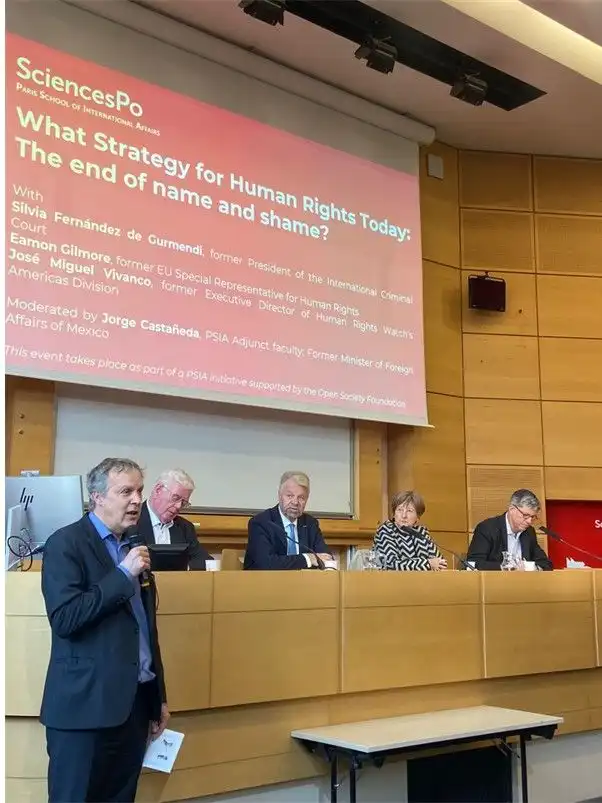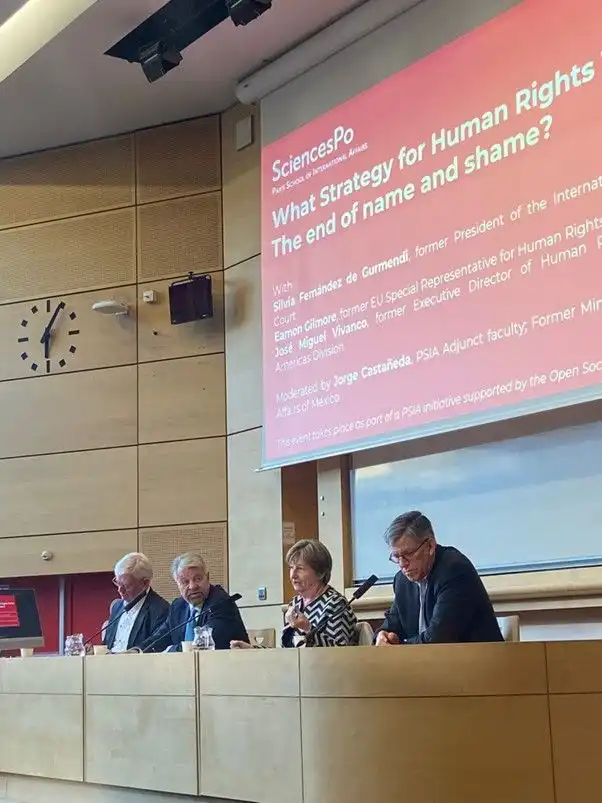Home>What Strategy for Human Rights Today
08.04.2025
What Strategy for Human Rights Today
Amid growing illiberal trends across various regions, the state of human rights is far from the relative stability observed over the past decades. To discuss the numerous challenges faced by human rights, PSIA was privileged to host an esteemed panel of experts in late March.
The event featured: Silvia Fernández de Gurmendi, former President of the International Criminal Court (2010–2018), José Miguel Vivanco, former Executive Director of Human Rights Watch's Americas Division and Eamon Gilmore, the EU Special Representative for Human Rights (2019-2024). The event was skillfully moderated by Jorge Castañeda, PSIA Adjunct faculty and former Secretary of Foreign Affairs of Mexico.

Human Rights Standards Under Attack
Silvia Fernández de Gurmendi opened the discussion by noting that human rights standards, once considered inviolable, are now under persistent attack. She highlighted how these standards are being undermined and questioned globally, a trend that signals a departure from the universal consensus achieved during the late 20th century. The erosion is not limited to values but extends to the very institutions designed to uphold them. Multilateral organisations like the United Nations, the Human Rights Council, and regional bodies are increasingly scrutinised and obstructed. Even courts such as the International Criminal Court and International Court of Justice face serious challenges, including attacks on their credibility, sanctions, and selective enforcement of their rulings.
Impact of Geopolitical and Technological Transformations
The geopolitical landscape has undoubtedly shifted. Eamon Gilmore emphasised that the current era represents one of the most significant transformations in politics and international relations since the Cold War. He made particular reference to the U.S.A - once a champion of human rights - which is increasingly perceived as inconsistent in its advocacy, for example, with its rollback on reproductive rights.
Mr. Gilmore also noted the new challenges presented by the digital age: privacy rights, the alignment of big tech with authoritarian regimes, and the weaponisation of social media platforms have emerged as critical issues.
Historical Perspective: Progress and Setbacks
José Miguel Vivanco provided a historical perspective to remind us of the progress made in the late 20th century. From the fall of the Berlin Wall to Latin America's transition from dictatorship to democracy, these and other milestones symbolised a near universal commitment to fundamental freedoms, human rights and the rule of law in the early 1990s.
However, Mr Vivanco noted that this consensus is now under strain and that the selective application of human rights standards - particularly in cases involving powerful nations - has undermined the legitimacy of international institutions.
The Role of International Courts and Sanctions
International courts remain a cornerstone of the human rights system. Mdm Fernández de Gurmendi and Mr Gilmore stressed the importance of defending these institutions and ensuring their consistency and resource adequacy.
When speaking on the integrity and effectiveness of the courts, Mdm Fernández de Gurmendi said that the institutions which uphold these rights face direct threats such as the imposition of sanctions on prosecutors. She offered a more hopeful conclusion by stating: “we can see that despite all the problems mentioned, the court still has ‘teeth’ and some coercive power that it can execute”.

Strategic Advocacy in a Fragmented Media Landscape
The fragmentation of media and the rise of social media have diminished the impact of traditional “name and shame” advocacy strategies. Mr Vivanco emphasised that human rights organisations must adapt by being more strategic in their research and advocacy efforts. Focused campaigns targeting specific issues or regions - e.g. Venezuela - can amplify impact, even in challenging environments. He emphasised the need to “not be apocalyptic - there are still democracies with vibrant civil societies, and here, media attention works”.
“Sanctions are not a panacea”
Sanctions, while a common tool in response to human rights violations, are, according to Mr Gilmore, “not a panacea”. In his response to a question from the audience on how to ensure these sanctions themselves do not create or contribute to a humanitarian crisis, Mr Gilmore noted the importance of distinguishing between individual and country-level sanctions. He also noted that many initiatives have been created to ensure the sanctions are monitored, but the amount of effort put into legislation has been disappointing.
Questions and conclusions
The event ended with some insightful questions from students, which culminated in an overall message that the system is most certainly under attack, but it is functioning.
Thank you to our wonderful panelists and chair and to the Open Society Foundation for their support.
Watch the replay of the event on PSIA Youtube page
Information Sessions: Masters

Find out more about the Masters programs and the wide choice of specialisations offered by the 8 Schools of Sciences Po during our webinars dedicated to applicants.